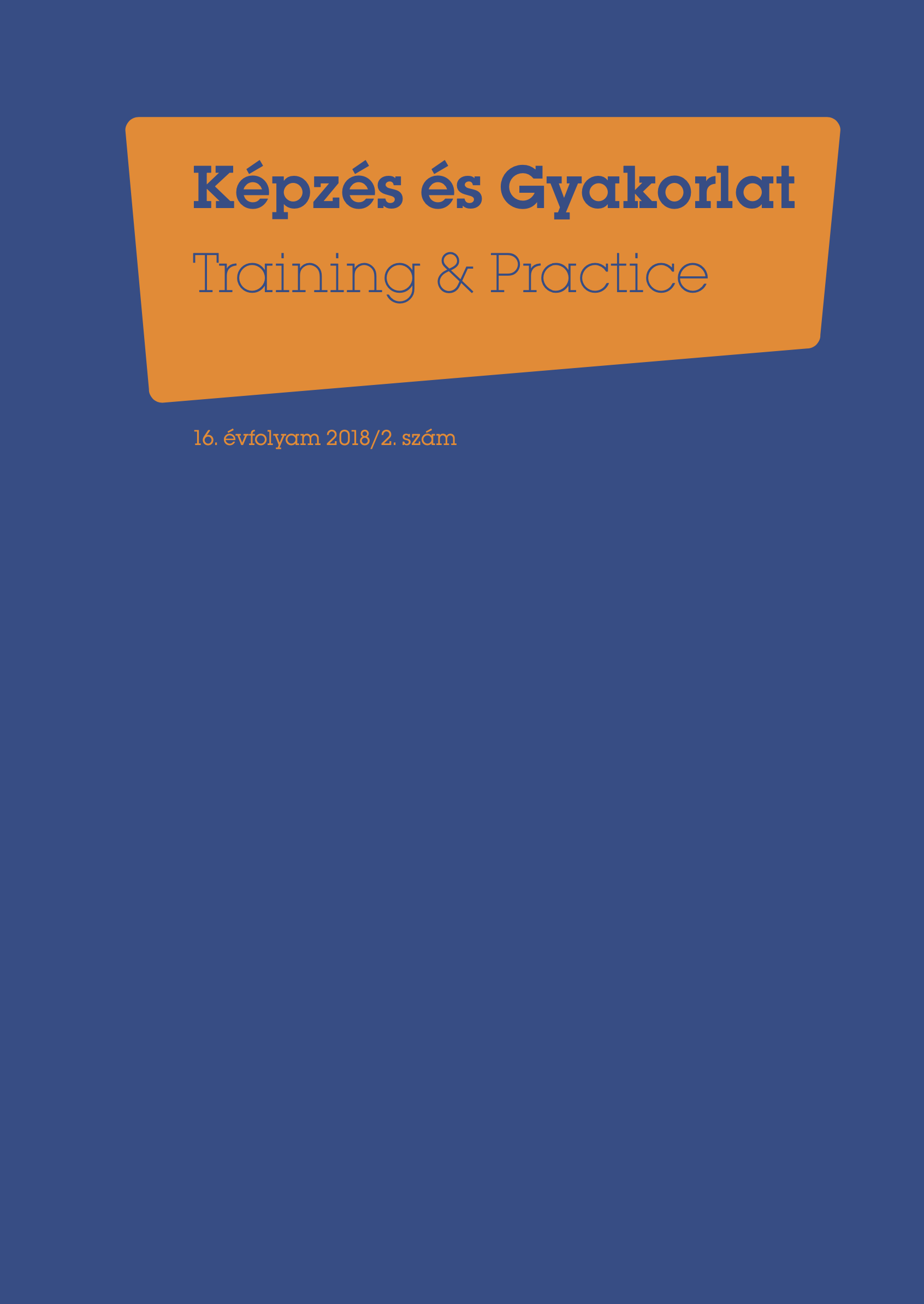Training for self-employment and active citizenship to achieve life satisfaction
DOI:
https://doi.org/10.17165/TP.2018.2.5Absztrakt
Forecasting the future of the world of work is difficult, dependent on multiple factors that are themselves unpredictable. The world of work is prone to transit from predominantly employee-based economies to entrepreneurial economies, involving the change in the work habits of individuals. The practical question arises: Are future generations ready to be entrepreneurial, and how to promote entrepreneurial education in the higher educational settings? The article below, beyond the purely economic rationale behind entrepreneurial education, tries to enumerate and examine the societal and psycho-social outcomes of self-employment such as life satisfaction and subjective well-being.
Hivatkozások
Diener, E., & Biswas-Diener, R. (2005). Psychological empowerment and subjective well-being. Measuring empowerment: Cross-disciplinary perspectives, 125. DOI: https://doi.org/10.1037/e597202012-007
Amoros, J. & Bosma, N. (2014). Global Entrepreneurship Monitor 2013 Global Report: Fifteen Years of Assessing Entrepreneurship across the Globe. Santiago de Chile.
Brown, E. J. -, McGrath, S. -& Morgan, W. J. (2009). Education, Citizenship and New Public Diplomacy in the UK: what is their relationship? Citizenship, Social and Economics Education, Vol. 8 Issue (2-3), 73-83. p. Symposium Journals. DOI: https://doi.org/10.2304/csee.2010.8.2.73
Diener, E. - Biswas-Diener, R. (2005). Psychological empowerment and subjective well-being. In D. Narayan (Ed.), Measuring empowerment: Cross-disciplinary perspectives (pp. 125-140). Washington, DC: World Bank. DOI: https://doi.org/10.1037/e597202012-007
Drèze, J. - Sen, A. K. (2002). India: Development and participation. Oxford University Press, USA. DOI: https://doi.org/10.1093/acprof:oso/9780199257492.001.0001
Hofstede, G. -, & McCrae, R. R. (2004). Personality and culture revisited: Linking traits and dimensions of culture. Cross-cultural research, 38(Vol. 38 Issue 1)., 52--88. p. DOI: https://doi.org/10.1177/1069397103259443
Huppert, F. A. -& So, T. (2009). What percentage of people in Europe are flourishing and what characterises them. Prepared for the OECD/ISQOLS meeting "Measuring subjective well-
being: an opportunity for NSOs?" Florence - July 23/24, Measuring subjective well-being: An opportunity for NSOs.
Jensen, L. A. -& Arnett, J. J. (2012). Going global: New pathways for adolescents and emerging adults in a changing world. Journal of Social Issues, Vol. 68(. Issue 3), 473-492. p. Wiley Online Library. DOI: https://doi.org/10.1111/j.1540-4560.2012.01759.x
Johanisova, N. - & Wolf, S. (2012). Economic democracy: A path for the future? Futures, Vol. 44(. Issue 6), . 562-570. Elsevier.p. DOI: https://doi.org/10.1016/j.futures.2012.03.017
Johnson, L., -& Morris, P. (2010). Towards a framework for critical citizenship education. The Curriculum Journal, Vol. 21(. Issue 1), . 77-96. p. DOI: https://doi.org/10.1080/09585170903560444
Marcketti, S. B. -, Niehm, L. S. -, & Fuloria, R. (2006). An Exploratory Study of Lifestyle Entrepreneurship and Its Relationship to Life Quality. Family and Consumer Sciences Research Journal, Vol. 34(. Issue 3),. 241--259. p. DOI: https://doi.org/10.1177/1077727X05283632
NCREL. (2001). North Central Regional Educational Laboratory. enGauge 21st-century Skills report. USA.
OECD (2016). Life Satisfaction [online] http://www.oecdbetterlifeindex.org/topics/life-satisfaction/ [2018.február 11.]
Osler, A. -& Starkey, H. (2004). Study on the Advances in Civic Education in Education Systems: good practices in industrialized countries. Report prepared for the Inter-American Development Bank, Education Network of the Regional Policy Dialogue. Citeseer.
Potgieter, I. -& Coetzee, M. (2013). Employability attributes and personality preferences of postgraduate business management students. SA Journal of Industrial Psychology, Vol. 39(. Issue 1), . 01-10. SA Journal of Industrial Psychologyp. DOI: https://doi.org/10.4102/sajip.v39i1.1064
Print, M. - Lange, D. (Eds). 2012). Schools, Curriculum and Civic Education for Building Democratic Citizens (Vol. 2). SpringerRotterdam: Sense Publishers. DOI: https://doi.org/10.1007/978-94-6209-167-2
Print, M. (2007). Citizenship education and youth participation in democracy. British journal of educational studies, Vol. 55(. Issue 3), . 325-345. Taylor & Francisp. DOI: https://doi.org/10.1111/j.1467-8527.2007.00382.x
Sen, A. K. (2005). Human Rights and Capabilities. Journal of Human Development, Vol. 6 (Issue 2), . 151--167. p. DOI: https://doi.org/10.1080/14649880500120491
Shepherd, D. -& Haynie, J. M. (2009). Birds of a feather don't always flock together: Identity management in entrepreneurship. Journal of Business Venturing, Vol. 24(. Issue 4), . 316-337. Elsevier.p. DOI: https://doi.org/10.1016/j.jbusvent.2007.10.005
Stiglitz, J. E. -, Sen, A., -& Fitoussi, J. P. (2009). Report by the commission on the measurement of economic performance and social progress. [online] https://hal-sciencespo.archives-ouvertes.fr/hal-01069384/ [2018.február 11.]
Tominc, P. -& Rebernik, M. (2007). Growth aspirations and cultural support for entrepreneurship: a comparison of post-socialist countries. Small Business Economics, Vol. 28(. Issue 2-3), . 239-255. p. Springer. DOI: https://doi.org/10.1007/s11187-006-9018-x
Torney-Purta, J., Schwille, J., & Amadeo, J. A. (1999). Civic education across countries: Twenty-four national case studies from the IEA civic education project. IEA Secretariat, Herengracht 487, 1017 BT, Amsterdam, The Netherlands.
Letöltések
Megjelent
Folyóirat szám
Rovat
License
Copyright (c) 2018 Horváth Zsuzsanna

This work is licensed under a Creative Commons Attribution-NonCommercial-NoDerivatives 4.0 International License.








